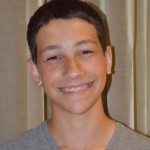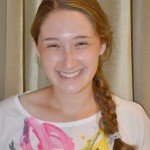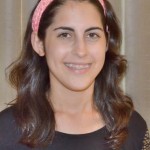This was the summer of the War in Gaza. For groups like ICE that meant itineraries were changed. Quickly.
“Our first week was supposed to be the in south,” says Yael Bar, 21, the assistant director of ICE this summer. She is in her last year at Stern College in New York.
“We moved everything around. We started out in the north, in places we didn’t plan on,” she says. The staff planned day-to-day and did things that weren’t planned.”
The kids adapted. The fact is they got to do things they would not normally have done.
Rugged v. Ancient
Eli Sider, 16, from Detroit, Michigan, a student at Frankel Jewish Academy and Kayla Wolnerman, 16, from the Five Towns, a student at the YU High School for Girls, were both on ICE.
They agreed that canoeing in the Jordan River was their favorite day.“We got to do a lot of water hikes in the north,” Sider says. “In Jerusalem you see the ancient side of Israel. By being in the north we also got to see Israel’s rugged side,” he says.
Rachel Gittler, 16, from Hollywood, Florida, a student at Weinbaum Yeshiva High School, was also on ICE. She agrees about the ruggedness. She laughs as she recalls the day they went rappelling. “There I was dangling from a rope and I was thinking, ‘This is amazing. I get to see Israel from a totally different angle,’” she says.
All the groups had to make the best of the situation. In the case of ICE, Bar says that the group was able to “experience a real aliyah to Yerushalayim. This was especially meaningful during the three weeks [leading up to Tisha b’Av]. We were in Eretz Yisrael but we couldn’t get to Yerushalayim,” she says. “The group really felt the anguish of being separate.”
“We talked to the group about not being in Yerushalayim,” says Hal Levy, 28, the ICE director and a doctoral student in education at Yeshiva University. “We explained that we were in Eretz Yisrael so the group shouldn’t be disappointed. What we wanted to explain is that being in Israel is a reason to be excited and passionate.”
“We also said Tehillim for the soldiers three times a day,” he says. “This was a constant source of motivation. The staff helped the NCSYers make the most of their experience.”
As it worked out, Levy feels that not coming to Jerusalem right away enhanced the experience when the group actually did arrive in the capital. “We davened mincha at the Kotel our first day in Jerusalem,” he says. “When we finished davening, the kids started singing. It was totally spontaneous. They set the tone and the staff joined in. They were really inspired.”
“This summer is all about rediscovering my Judaism,” Wolnerman says. “Being at the Kotel had special meaning for me.
It really inspired me. I feel like I want to be a better Jew,” she says.Added Significance
Two other venues in Jerusalem were especially meaningful this summer: Yad Vashem and the military cemetery on Jerusalem’s Mt. Herzl. They took on added significance because of “the situation,” as the war was termed in Hebrew.
“Being in Israel this summer, NCSYers really felt that they were part of the overall situation,” Levy says. “They understood that it’s not American Jews and Israeli Jews. It’s Am Yisrael. We really are one. There’s no distinction,” he says
“Every time I saw a soldier, no matter where we were, I thought maybe I’ll see my close friend who is in the IDF,” Wolnerman says.
“When we got to Mt. Herzl, a military funeral had just finished,” Wolnerman says. “I felt really connected to Am Yisrael at that moment.”
“The group understood that these soldiers are people – just like them. It made a real impact on them,” Levy says.
In addition to all the unexpected experiences in the north and the quintessential Jerusalem experiences that were somewhat different this year, the ICE group also volunteered several times.
“We volunteered at an absorption center where Ethiopian olim live,” Wolnerman says. “We also visited with victims of terror attacks through the One Family organization.” They did whatever the family wanted. In Wolnerman’s case her group helped paint an elderly couple’s porch and helped them pack boxes.
”It was very cool to know that we were helping them,” Sider says.
“It’s amazing how things changed this summer,” Bar says.
“At the airport in New York before they left, the NCSYers were nervous and their parents were calming them down. But now that they’re in Israel, the kids are fine and they’re comforting their parents.”“The thing is, everyone in Israel talks about how we are all one family,” Wolnerman says. “If you haven’t been here, you can’t understand it,” she says. “There’s something in the air. There we were at Mt. Herzl. The soldiers were crying. We were crying. I wanted to go over and hug one of the soldiers. After all, we’re all brothers and sisters,” she says.



